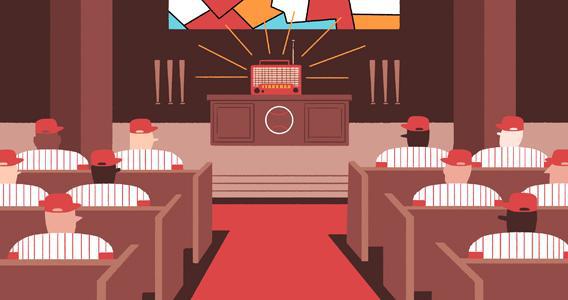Hanging above the dresser in my bedroom, encased in Plexiglas, is a baseball. A birthday gift from my wife, the ball bears the 1982 World Series logo and was signed, at some point between then and now, by Robin Yount, the Milwaukee Brewers’ star shortstop and that season’s AL Most Valuable Player. The T in his signature resembles a star.
I’ve got a patchy memory that some weeks after the Brewers lost to the St. Louis Cardinals in the 1982 series, my grandfather took me to a breakfast sponsored by the Knights of Columbus, or maybe the Lions Club. I don’t remember whether my grandfather cared all that much about baseball, but I think we went because my father—his son—had died as the season was just getting underway and my family was trying to treat us kids to special events when they could. This qualified. The Brewers were all there—Molitor, Cooper, Gantner, Oglivie, Fingers, Yount, of course—and I left with a baseball signed by the whole team.
One summer day some years later, a neighbor and I were playing a game we called “Kirby Puckett,” which had us leaping up against an imaginary centerfield wall to make miracle catches, just the way the Minnesota Twins’ centerfielder did. (Playing “Robin Yount” involved laying out to save a no-hitter.) The ball we were using got away, as the ball we were using often did—only this time it rolled across my front lawn and into a drain. When I emerged from the house with my autographed ball, we each promised the other it would never hit the ground. We’d catch every toss.
In his new book, Baseball as a Road to God, John Sexton, president of New York University (where, full disclosure, he and I both teach), includes a similar story by essayist Leonard Kriegel. Stricken with polio as a child, Kriegel was once presented, while in the hospital, with a ball signed by the 1945 Detroit Tigers. In his own writing Kriegel recalls, “That ball simply embodied the idea of physical grace—a grace that had been ripped from my life by the virus.”
Time passed. And one day, Sexton recounts, while playing catch “the ancient ball they were using simply fell apart,” and Kriegel and a friend had reason to fetch that Tigers ball from the house. I imagine them making promises to catch every toss. And yet: “One by one, the names on the ball disappeared, chalked and cut and scuffed into oblivion by granite and brick and creosote.”
That is what happened to my Brewers ball too, of course. No one catches every toss. Fathers die. So do sons. Children are afflicted. Still, Kriegel can say about that ball: “For one last time, it had rescued me from a bad day.”
This is baseball to John Sexton. Grace and affliction. Miracles and doubt. Belief and joy and ecstasy, too. In his book Sexton argues that there are moments in the game that lift us out of our regular existence: rescuing us, say, from another bad day; granting us an experience, in the words of one theologian, of “‘standing outside of oneself’—without ceasing to be oneself” (the textbook definition of ecstasy).
Now, it needn’t be baseball, Sexton is clear to point out, that takes us out of ourselves. Organized religion can sometimes work. So might music or art. But Sexton’s hope, in chapters that follow the innings 1 through 9—with room set aside, as well, for a pregame show, a seventh-inning stretch, and a return to the clubhouse—is to reveal that this game can evoke the very “essence of religion,” that “inside the game the formative material of spirituality can be found.”
In baseball, time passes more slowly than in the real world, Sexton notes, and without a clock to regulate the game it could go on forever. This slowness and, with it, a suggestion of eternity, trains us to see the world more fully and with more care. And this feels true—the slowness, at least—until you look back and realize no game ever has gone on forever. Or, until you recall with a sense of deepening nostalgia, as Sexton does, the days when the Dodgers played in Brooklyn, which makes you realize just how quickly time actually goes. The Dodgers have been in Los Angeles for more than half a century—long enough to allow for Sexton’s conversion to the Yankees. My Brewers have played in the National League for almost 15 years now. Yount’s been on the shelf for nearly 20. Yet, somehow, every game is still a break from that time speeding by.

Photo by NYU Photo Bureau Madere
Each spring for more than a decade, as if in anticipation of the upcoming baseball season, Sexton has offered an undergraduate course, also called “Baseball as a Road to God.” (The book is co-authored by Thomas Oliphant and Peter J. Schwartz, friends and colleagues of Sexton who both have long connections with the course. Oliphant’s best-selling Praying for Gil Hodges has been included on the syllabus over the years. Schwartz was the first student ever enrolled in the course.) This class and the book both rely on two terms of art from Sexton’s earlier days in religious studies to pave the road between baseball and the divine. The first is ineffable, “indescribable in words yet … palpable and real.” The second is hierophany, a term borrowed from University of Chicago legend Mircea Eliade, which means “a manifestation of the sacred or holy.” And to bring these terms together, Sexton takes us to Yankee Stadium. The date: Oct. 4, 1955. The Dodgers’ shortstop Pee Wee Reese tosses a low ball across the diamond, and first baseman Gil Hodges catches it. Game over.
“In the basement of my family’s home, my friend Bobby ‘Dougie’ Douglass and I knelt and prayed with all the intensity we could muster, grasping between us in dynamic tension each end of a twelve-inch crucifix we had removed from the wall. … We prayed before a radio instead of an altar, which broadcast the sounds of Game Seven of the 1955 World Series instead of hymns. … For three innings, time had slowed; but in that moment it froze: The Brooklyn Dodgers had won the World Series! Seven decades of waiting were over! Dougie raised his arms in exultation, releasing the crucifix, whereupon the laws of physics drove the head of Christ into my mouth, chipping my front tooth. I wore that chipped tooth, unrepaired, as a visible memento for nearly fifty years.”
“October 4, 1955,” Sexton concludes. “For me and millions of others, a sacred day. Why? Hard to put into words. Impossible to capture completely in our limited vocabulary.” One catch by a first baseman who throughout a season may catch hundreds and hundreds of tosses across the diamond, who in a career gloves thousands of outs—this catch is a hierophany. Without it, the day might just have fallen into the realm of the profane, easy to capture with available words: Another Dodgers loss. Another season lost. Wait ’til next year. What makes it ineffable—for Sexton and those millions of others—is the wonder and joy, the miracle at long last, of a Brooklyn win.
Sexton’s writing is not always up to the likes of Whitman or Updike or Bernard Malamud, some of his favorites whose writings on baseball make appearances in the book. There’s nothing from Sexton in Baseball as a Road to God that’s as moving, say, as this, from onetime Yale president and former commissioner of the major leagues, A. Bartlett Giamatti:
“Baseball is about going home, and how hard it is to get there and how driven is our need. It tells us how good home is. Its wisdom says you can go home again but that you cannot stay. The journey must always start once more, the bat an oar over the shoulder, until there is an end to all journeying. Nostos; the going home; the game of nostalgia, so apt an image for our hunger that it hurts.”
And where God is concerned, Sexton’s not quite Abraham Joshua Heschel or Paul Tillich or Rudolf Otto, the theological stalwarts he’s been raised on and the non-doctrinaire believers he most believes in. But the God they describe—always the indescribable one—is the one at the center of the book and his course. Here’s Tillich, for instance: “The name of this infinite and inexhaustible depth and ground of all being is God. That depth is what God means. And if that word has not much meaning for you, translate it, and speak of the depths of your life, of the source of your being, of your ultimate concern, of what you take seriously without reservation.” And here’s Heschel: “By the ineffable we mean that aspect of reality, which by its very nature lies beyond our comprehension and is acknowledged by the mind to be beyond the scope of the mind”—a thought that Sexton follows with: “Like what Dougie and I experienced that day in 1955 when the ball landed in Hodges’s glove.”
I think it’s worth taking a moment to acknowledge that a grown man with an autographed baseball hanging on his wall is probably more inclined than non-fans to find Sexton’s argument worthwhile. Yet what’s most striking about Sexton’s book is its reminder of just how rare it has become for a professor—or a teacher of any sort, even a religious one—to ask a student to go with him on a journey into the depths of a life or the source of being. The notion that we might take anything seriously without reservation is not one that tends to get much play, in my experience, even in Religion or English 101. But Sexton—teaching sophomores and juniors and now writing for readers of all ages—is a true believer. It isn’t doctrine he’s talking about. It’s not rote prayer. Sexton believes in the language we use—and the ways that language fails us—when describing what concerns us most. He believes there’s more to existence than what we can say. And he believes it’s worthwhile to remind young people, especially, of this, to advise them to slow down in the way baseball slows its fans down, and find ways to see more in life, to see more intensely. Our lives are never slow for long, yet baseball, Sexton says, “calls us to live slow and notice.”
Play a game. Play in the street. Scuff a ball. Go for breakfast when your team loses. Long for home. And be rescued by baseball from one more bad day. It’s a generously long season. Our long winter is nearly done. We’ve all got a lot to look forward to. So live slow. Because it will all, all of it, go by so, so fast.
—
Baseball as a Road to God: Seeing Beyond the Game by John Sexton, with Thomas Oliphant and Peter J. Schwartz. Gotham.
See all the pieces in this month’s Slate Book Review.
Sign up for the Slate Book Review monthly newsletter.
